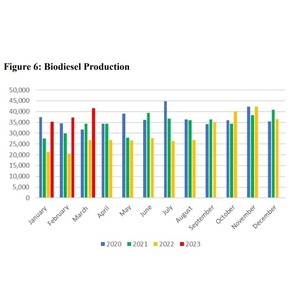Report: Canadian consumption of biobased diesel to grow in 2023

August 24, 2023
BY Erin Krueger
Canadian consumption of biodiesel and renewable diesel was down approximately 2.3 percent in 2022 but is expected to rebound this year, growing by an estimated 2.6 percent, according to a report filed with the USDA Foreign Agricultural Service’s Global Agricultural Information Network.
The consumption of biobased diesel fuels is expected to increase more substantially in the future due to Canada’s Clean Fuel Regulation, which became law in July 2022. The CFR aims to reduce the carbon intensity (CI) of liquid transportation fuels and is expected to boost the consumption of ethanol, biobased diesel and other renewable fuels. The report cites an estimate by Environment and Climate Change Canada that indicates the CFR could boost the consumption of low-CI diesel by 2.2 billion liters (581.18 million gallons) and the consumption of ethanol by 700 million liters by 2030. In addition to the federal CFR, biofuel consumption in Canada is supported by various provincial regulations.
Canada consumed approximately 760 million liters of biobased diesel last year, including 380 million liters of biodiesel and 360 million liters of renewable diesel. Consumption of biobased diesel is expected to increase to 840 million liters this year, including 380 million liters of biodiesel and 460 million liters of renewable diesel.
Advertisement
Advertisement
The country had 11 operational biodiesel plants last year, down from 12 in 2021. The number of operational biodiesel plants is expected to hold steady this year. The combined capacity of Canada’s biodiesel plants was 912 million liters in 2021, falling to 893 million liters last year. Biodiesel capacity is expected to increase to 913 million liters this year. Capacity utilization was at 46 percent in 2021 and 40 percent last year. Capacity utilization is currently expected to be at 46 percent this year. Domestic production is expected to reach 420 million liters this year, up from 357 million liters in 2022 and 416 million liters in 2021.
Canada’s only stand-alone renewable diesel plant began commercial operations earlier this year. That facility, operated by Tidewater Midstream, has a nameplate capacity 170 million liters and is expected to operate at 35 percent capacity this year.
Prior to operations beginning at Tidewater, Canada imported all the renewable diesel it consumed. Renewable diesel imports were at 472 million liters in 2021, 380 million liters in 2022 and are expected at 400 million liters this year. No renewable diesel exports are currently expected for 2023.
Canada also imports and exports biodiesel. Biodiesel imports are expected to fall to 360 million liters this year, down from 400 million liters last year and 422 million liters in 2021. Biodiesel exports are expected to reach 400 million liters this year, up from 379 million liters in2022, but down from 440 million liters in 2021.
Advertisement
Advertisement
For overall blend rate for biobased diesel in Canada is expected to reach 2.6 percent this year, compared to 2.3 percent in 2022 and 2.6 percent in 2021.
A full copy of the report is available on the USDA FAS GAIN website.
Related Stories
Avfuel Corp., the leading independent supplier of aviation fuel and services, is expanding its sustainable aviation fuel (SAF) footprint with the addition of a new, strategic supply point in Denver, Colorado—the first of its kind in the region.
CVR Energy Inc. on July 30 reported its renewables segment achieved increased throughput during Q2 despite unplanned downtime but reported a net loss of $11 million. The company expects to retroactively claim the 45Z credit for volumes produced.
Total U.S. operable biofuels production capacity expanded in May, with gains for renewable diesel and a small decrease for ethanol, according to data released by the U.S. Energy Information Administration. Feedstock consumption was up.
SAF-producer XCF Global Inc. on July 28 announced it has signed an exclusive, non-binding indication of intent (IOI) with a renewable fuels infrastructure and feedstock solutions company based in the western U.S.
The abrupt closure announcement by Biox Corp. is the latest example of a failure to secure Canada's domestic energy supply, says Unifor. The Canadian energy union is advocating for simply regulatory changes that could help restart the facility.
Upcoming Events










